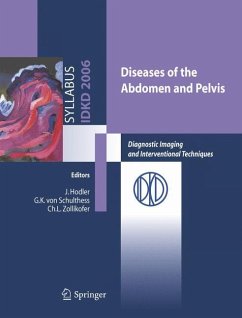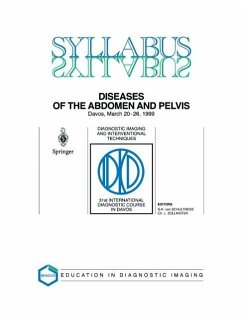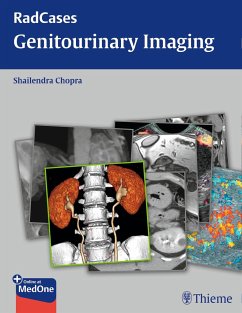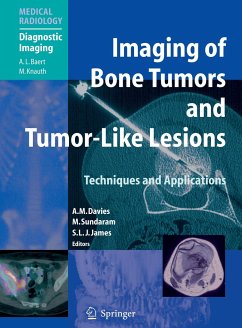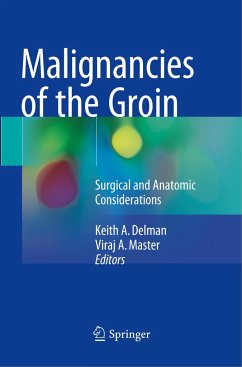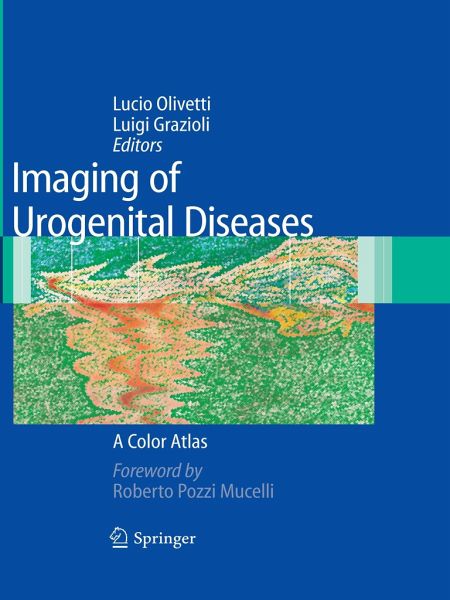
Imaging of Urogenital Diseases
A Color Atlas
Herausgegeben: Olivetti, Lucio; Grazioli, Luigi
Versandkostenfrei!
Versandfertig in 6-10 Tagen
122,99 €
inkl. MwSt.

PAYBACK Punkte
61 °P sammeln!
Nowadays, there is tremendous interest in an integrated imaging approach to urogenital diseases. This interest is tightly linked to the recent technological advances in ultrasound, computed tomography, magnetic resonance imaging, and nuclear medicine. Significant improvements in image quality have brought numerous clinical and diagnostic benefits to every medical specialty.This book is organized in nine parts and twenty-seven chapters. The first six chapters review the normal macroscopic and radiological anatomy of the urogenital system. In subsequent chapters, urogenital malformations, lithia...
Nowadays, there is tremendous interest in an integrated imaging approach to urogenital diseases. This interest is tightly linked to the recent technological advances in ultrasound, computed tomography, magnetic resonance imaging, and nuclear medicine. Significant improvements in image quality have brought numerous clinical and diagnostic benefits to every medical specialty.
This book is organized in nine parts and twenty-seven chapters. The first six chapters review the normal macroscopic and radiological anatomy of the urogenital system. In subsequent chapters, urogenital malformations, lithiasis, as well as infectious and neoplastic disorders of the kidneys, bladder, urinary collecting system, and male and female genitalia are extensively discussed. The pathologic, clinical, and diagnostic (instrumental and not) features of each disease are described, with particular emphasis, in neoplastic pathologies, on primitive tumors and disease relapse. The statics and dynamics of the pelvic floor are addressed as well and there is a detailed presentation of state-of-the-art interventional radiology.
The volume stands out in the panorama of the current medical literature by its rich iconography. Over 1000 anatomical illustrations and images, with detailed captions, provide ample evidence of how imaging can guide the therapeutic decision-making process. Imaging of Urogenital Diseases is an up-to-date text for radiologists, urologists, gynecologists, and oncologists, but it also certainly provides an invaluable tool for general practitioners. Its succinct, well-reasoned approach integrates old and new knowledge to obtain diagnostic algorithms. This information will direct the clinician to the imaging modality best-suited to yielding the correct diagnosis.
This book is organized in nine parts and twenty-seven chapters. The first six chapters review the normal macroscopic and radiological anatomy of the urogenital system. In subsequent chapters, urogenital malformations, lithiasis, as well as infectious and neoplastic disorders of the kidneys, bladder, urinary collecting system, and male and female genitalia are extensively discussed. The pathologic, clinical, and diagnostic (instrumental and not) features of each disease are described, with particular emphasis, in neoplastic pathologies, on primitive tumors and disease relapse. The statics and dynamics of the pelvic floor are addressed as well and there is a detailed presentation of state-of-the-art interventional radiology.
The volume stands out in the panorama of the current medical literature by its rich iconography. Over 1000 anatomical illustrations and images, with detailed captions, provide ample evidence of how imaging can guide the therapeutic decision-making process. Imaging of Urogenital Diseases is an up-to-date text for radiologists, urologists, gynecologists, and oncologists, but it also certainly provides an invaluable tool for general practitioners. Its succinct, well-reasoned approach integrates old and new knowledge to obtain diagnostic algorithms. This information will direct the clinician to the imaging modality best-suited to yielding the correct diagnosis.



